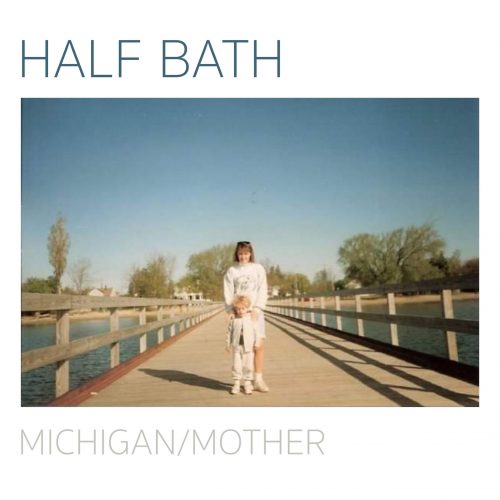Music carries a unique ability to remind us of our mutual humanity. Sure, the listening experience can be solitary—one riff can catalyze a mental chain reaction and bring us back to an intimate, personal past memory. But music is also an inherently communal experience. For when we listen to music, even if by ourselves, we get a unique gateway into others’ inner life stories through which we can reflect on our own experiences. That is, we can find similarities in the emotions cultivated by the soulful timbre of an R&B groove, or a folk lyricist’s poetic tales can illuminate similar life experiences shared not only with the artist who sings them but with other listeners.
It is this quality—that ability to sing to and connect individual souls—that is achieved with the song “Michigan” by Half Bath, a Washington D.C.-based group led by Reed Doherty.
This track rests at the intersection of easy indie and country-folk, blending a light synth and a acoustic guitar-led cadence and crooning layered vocals—the effect of which is to cultivate a warm atmosphere akin to the rosy antiquated romance of a western dance hall or the comforting echo of a band playing to an almost empty local bar.
Yet the lyrics of this track are just as intimate. Described—along with Half Bath’s other release “Mother”—as “two lil songs about family and guilt and mopeds and transient young folx,” “Michigan” is certainly a track that not only paints a vivid picture of the singer’s personal pitfalls but is a forceful push for us to look into the mirror of our past and confront our own feelings of contrition.
Two stories interact throughout the track—one of guilt and the other other a tale of a nomadic woman, moving cross-country. The tale of this woman’s journey carries a more optimistic air, rooted in the pursuit of a better state of living, yet the singer’s feelings of guilt are rooted in his lack of reconnecting with loved ones—the fact that “I’m only here/Every couple of years.” However, the singer is cognizant of his shortfalls and seeks reconciliation.
Left my new number on the fridge
You can text whenever
I promise not to take two months to get back
I’ll be better
Yet despite these efforts to change, his guilty conscience only seems to become more present as it is revealed that the singer rarely “comes back” despite the onslaught of love given to him, likely by this transient woman.
I left my favorite button-down
You shipped it for me
With a note that said you’re proud of me
And you adore me
I’m only here
Every couple of years
I only come back
When Dad has a heart attack…
It is after this verse that the spritely tune descends into a quick dark electronic screech—as if to signify an internal scream or a brief succumbing to the existentialist feelings of guilt. However, this relapse into this destructive feeling quickly dissipates and the lively melody returns, perhaps like a false smile to obscure the pain or perhaps a signal that the singer is tackling regret with optimism.
Yet despite this added positivity through the melody, the singer ultimately wallows in this guilt, connecting these two tales of regret and that of the transient woman, realizing “you ran away ‘cause someone ignored ya/Back in Michigan.” Perhaps her nomadic journey was not a positive pursuit of a better life after all, but a retreat from the singer’s indifference toward her.
On their Soundcloud account, Half Bath writes that they “[make] tunes to bring out the existential trickle of dread like that of a slowly draining bath,” and that feeling is certainly captured in their single “Michigan.” However, this dread is not completely negative. For in illuminating their own inner struggles and inspiring us to do the same, “Michigan” brings about a communal emotional experience. It lays bare the innate yet taboo feelings of guilt that make us all human and packages it in a beautifully thoughtful indie-folk sound that entices us to engage with these feelings.







